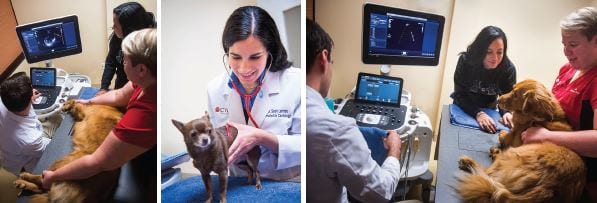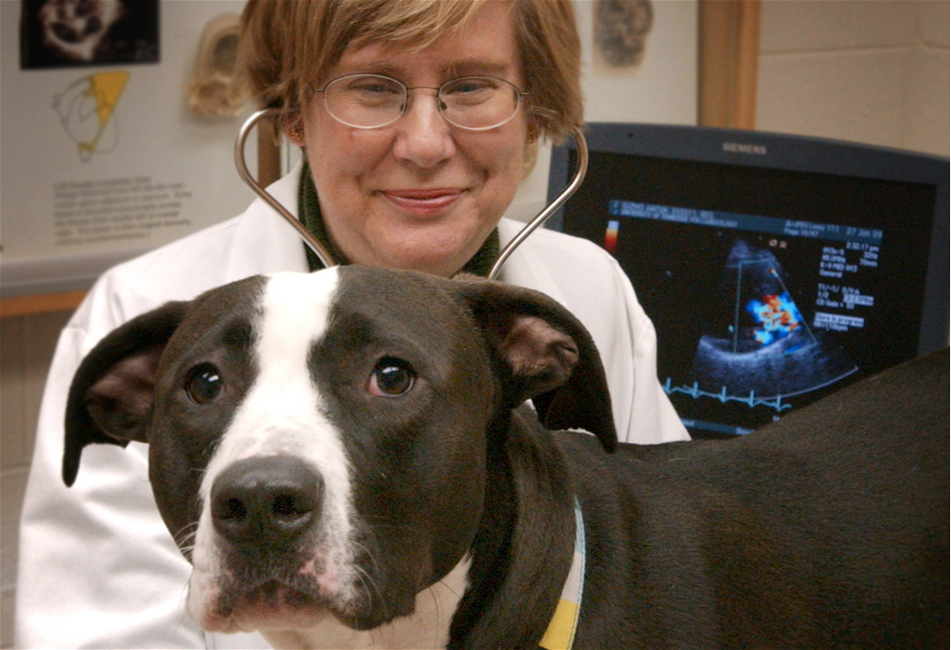Discovering the Crucial Solutions Offered by a Vet Cardiologist: Comprehending Ultrasound and CT Scan Strategies
Veterinary cardiologists play a crucial function in the health of pet dogs by identifying and treating various heart disease. They use advanced imaging methods, such as heart ultrasound and CT scans, to give precise analyses. Each method has its distinctive benefits and applications. Comprehending these strategies is essential for family pet owners looking for the most effective treatment for their buddies. What elements should pet proprietors think about when choosing in between these diagnostic devices?

The Function of Vet Cardiologists in Pet Dog Healthcare
Veterinary cardiologists play an important function in the health care of family pets, concentrating especially on detecting and dealing with heart-related problems. They have specialized training that enables them to translate complicated analysis examinations and determine different cardio problems. These professionals utilize advanced strategies, such as echocardiography and electrocardiography, to examine heart feature and structure accurately.Veterinary cardiologists also develop tailored treatment plans that may consist of medicines, way of life adjustments, and, in some cases, surgical treatments. Their knowledge encompasses educating pet proprietors regarding heart health and wellness, emphasizing the importance of normal examinations and very early discovery of potential troubles. Cooperation with general veterinarians is essential, as it ensures extensive care for pets with believed cardiac concerns. By using specialized services, vet cardiologists considerably improve the quality of life for animals and provide satisfaction for their proprietors, strengthening the relevance of heart health in overall animal health.
Usual Heart Problems in Pets
Common cardiac issues in pets can substantially impact their health and lifestyle. Heart murmurs, various kinds of cardiomyopathy, and hereditary heart defects are amongst the most common problems that veterinarians encounter. CT Scans For Animals. Understanding these problems is important for family pet owners to ensure prompt diagnosis and proper treatment
Heart Murmurs in Pets
Heart murmurs can be a source of problem for pet owners, they are not constantly a measure of serious health problems. A heart whispering is an irregular sound created by unstable blood circulation within the heart. In pet dogs, these whisperings can be brought on by different aspects, consisting of congenital heart problems, shutoff problems, and even anxiety throughout exams. Many animals with heart whisperings lead regular lives without substantial wellness influences. To determine the underlying reason, veterinary cardiologists commonly employ diagnostic techniques such as echocardiograms and Doppler ultrasounds. Early detection and assessment are important, as they may help handle any type of prospective cardiac issues efficiently. Pet owners are encouraged to consult their veterinarian for a comprehensive examination if a heart whispering is detected.
Cardiomyopathy Types Explained
Cardiomyopathy encompasses a team of illness impacting the heart muscle mass, causing jeopardized cardiac function in pets. One of the most typical kinds consist of dilated cardiomyopathy (DCM), hypertrophic cardiomyopathy (HCM), and limiting cardiomyopathy (RCM) DCM mostly impacts canines, triggering the heart to weaken and increase the size of, which reduces its capability to pump blood efficiently. In comparison, HCM is extra common in cats, defined by the enlarging of the heart walls, frequently leading to obstructed blood circulation. RCM, though less usual, happens when the heart muscle comes to be stiff, restricting its capacity to loaded with blood. Each kind provides unique obstacles in diagnosis and therapy, necessitating specialized vet cardiological assessment to assure peak administration and look after impacted family pets.
Congenital Heart Flaws
Congenital heart problems stand for a considerable group of cardiac concerns in pets, unique from obtained conditions such as cardiomyopathy - CT Scans For Animals. These problems are architectural irregularities existing at birth, influencing the heart's regular function. Typical kinds consist of license ductus arteriosus, ventricular septal issues, and pulmonic constriction. Symptoms may differ extensively, ranging from moderate to extreme, and can include workout intolerance, coughing, and trouble breathing. Early diagnosis with innovative imaging methods like ultrasound is vital for reliable management. Veterinary cardiologists play a vital role in identifying these problems and advising appropriate therapy choices, which might consist of clinical monitoring or surgical treatment. Recognizing congenital heart problems permits for better outcomes and improved lifestyle for influenced pets
Comprehending Cardiac Ultrasound: Exactly How It Works
A considerable variety of vet techniques currently make use of heart ultrasound as a crucial analysis device for examining heart wellness in pets. This non-invasive strategy makes use of high-frequency acoustic waves to develop photos of the heart's framework and function. During the treatment, a vet service technician applies a gel to the pet's upper body and makes use of a transducer to emit ultrasound waves. These waves jump off the heart and bordering frameworks, producing real-time pictures on a monitor.Veterinarians can evaluate various aspects of heart wellness, consisting of chamber size, wall surface activity, and shutoff function. In addition, heart ultrasound permits the detection of abnormalities such as liquid build-up and congenital heart defects. This technique is essential for identifying problems that might not be visible through typical radiographs. By giving in-depth information concerning the heart's makeup and performance, cardiac ultrasound aids in creating reliable treatment prepare for animals experiencing heart disease.
The Importance of CT Checks in Diagnosing Heart Issues
How do CT scans boost the medical diagnosis of heart problems in veterinary medication? CT scans give in-depth cross-sectional photos of the heart and surrounding structures, permitting vets to picture complex anatomical partnerships. This imaging technique is especially beneficial in determining hereditary heart flaws, cardiac growths, and abnormalities in capillary. By using innovative imaging algorithms, CT scans can examine heart chamber dimensions and function, supplying a comprehensive view that may be hard to achieve with traditional methods.Additionally, CT angiography can envision blood circulation and determine locations of stenosis or blockage, which is crucial for planning prospective interventions. The rate and accuracy of CT scans additionally promote fast diagnoses, vital in emergency scenarios. Eventually, the consolidation of CT scans right into vet cardiology significantly boosts the accuracy of diagnoses, allowing targeted therapy plans and improving individual end results for animals experiencing heart problems.
Contrasting Ultrasound and CT Scan Techniques
While both ultrasound and CT scans are very useful devices in vet cardiology, they use distinct advantages and constraints that influence their usage in detecting heart disease. Ultrasound, or echocardiography, provides real-time imaging of the heart's structure and feature, allowing vets to evaluate heart chambers, shutoffs, and blood flow. It is especially efficient for assessing conditions like coronary infarction and cardiomyopathy. Nonetheless, ultrasound might be limited in picturing specific physiological frameworks as a result of individual dimension or obesity.In contrast, CT scans offer comprehensive cross-sectional pictures of the heart and surrounding cells, making click here now them perfect for recognizing architectural problems, lumps, or vascular concerns. CT scans offer comprehensive insights, they call for sedation and may entail radiation exposure. Eventually, the selection between ultrasound and CT scans depends on the specific professional circumstance, the individual's condition, and the information required for a precise diagnosis.
Treatment Options Available Through Veterinary Cardiology
Vet cardiology provides a series of treatment choices customized to address numerous heart problems in animals. Treatment plans usually start with way of living adjustments, including diet adjustments and exercise adjustments, targeted at improving total heart wellness. Drugs play a crucial role, with cardiologists prescribing drugs such as diuretics, beta-blockers, and ACE inhibitors to manage signs and enhance heart function.In extra serious cases, interventional treatments, such as balloon valvuloplasty or stent positioning, may be needed to reduce blockages or boost blood flow. For certain genetic heart issues, medical choices may be explored to correct structural concerns. Additionally, ongoing monitoring and follow-up care are crucial elements of a detailed treatment strategy, allowing for timely changes based on the family pet's action to treatment. Generally, vet cardiology concentrates on giving efficient, customized treatment to maximize the wellness and health of pet individuals with heart disease.
How to Prepare Your Pet for a Cardiac Assessment
Preparing a pet for a heart assessment is important to assure exact outcomes and a smooth process. Proprietors must first schedule the consultation with the veterinary cardiologist and review any certain needs or worries. It is a good idea to hold back food for a minimum of 12 hours before the analysis, as this aids improve imaging high quality throughout procedures like ultrasound or CT scans.Additionally, preserving a calm setting on the day of the consultation can help in reducing the pet's stress and anxiety. It is valuable to bring along any appropriate medical documents, consisting of previous examinations and medicines (Cancer Veterinary Near Me). Owners must also ensure that their pet dog is comfortable and leashed throughout transportation to the facility. Finally, acquainting themselves with the evaluation process can reduce worries and help in asking informed concerns during the consultation. By following these steps, proprietors can contribute considerably to the efficiency of the cardiac analysis
Frequently Asked Questions
How much time Does a Cardiac Ultrasound or CT Scan Take?
The duration of a cardiac ultrasound commonly varies from 30 to 60 minutes, while a CT check may take roughly 15 to thirty minutes. Elements such as the client's problem can influence these time price quotes.

Are There Any Kind Of Dangers Related To These Analysis Treatments?

Can I Remain With My Animal During the Procedure?
The veterinary facility's policy commonly determines whether her latest blog animal proprietors can continue to be during procedures. While some centers urge proprietor visibility for comfort, others may need separation to ensure security and ideal conditions for analysis imaging.
Just how much Do These Analysis Examinations Generally Price?
The prices of analysis tests, such web as ultrasound and CT scans, typically vary based on location and center. Usually, rates vary from a couple of hundred to over a thousand dollars, reflecting the complexity and modern technology involved.
What Is the Recuperation Process After a Heart Analysis?
The recuperation procedure after a cardiac examination includes keeping track of the pet dog for any kind of instant responses, making sure comfort, and limiting exercise. Vets generally give post-evaluation directions to lead pet dog proprietors throughout this essential recuperation period. Heart whisperings, various types of cardiomyopathy, and congenital heart issues are amongst the most prevalent problems that veterinarians come across. A heart whispering is an unusual audio generated by stormy blood circulation within the heart. Cardiomyopathy incorporates a team of diseases affecting the heart muscle mass, leading to jeopardized cardiac function in pets. Genetic heart flaws stand for a significant category of heart problems in family pets, distinctive from acquired conditions such as cardiomyopathy. Ultrasound, or echocardiography, gives real-time imaging of the heart's structure and feature, enabling vets to assess heart chambers, valves, and blood circulation.